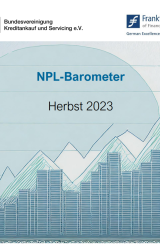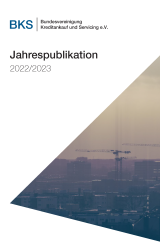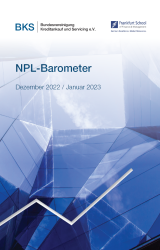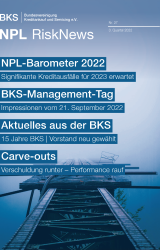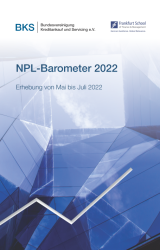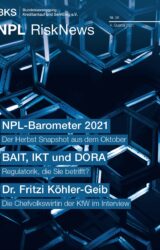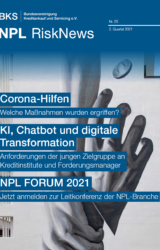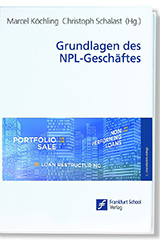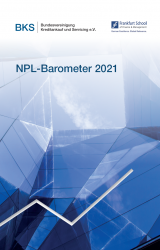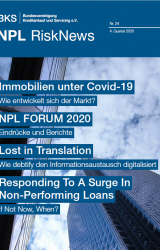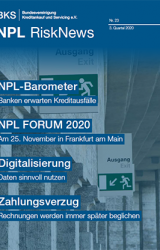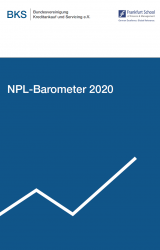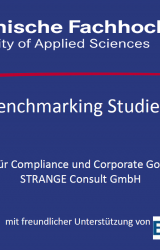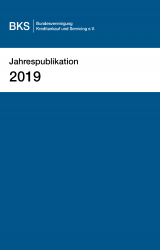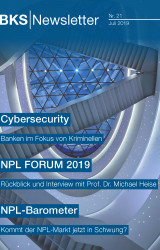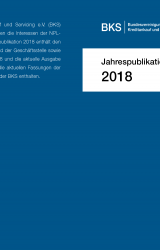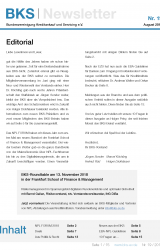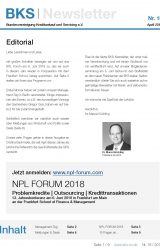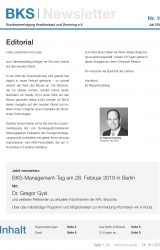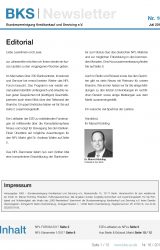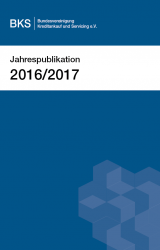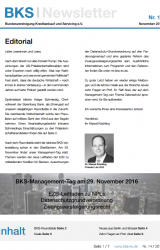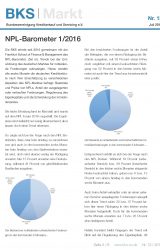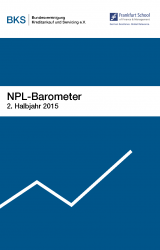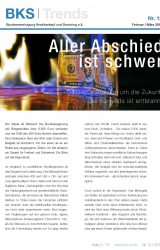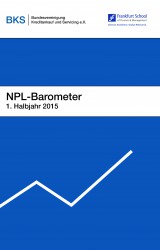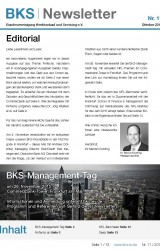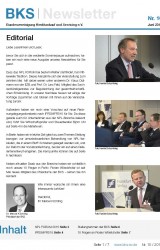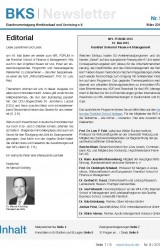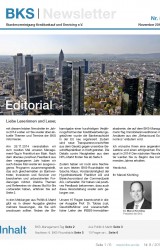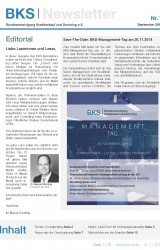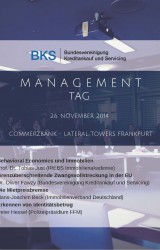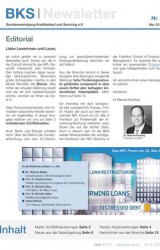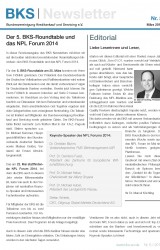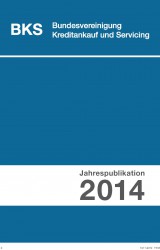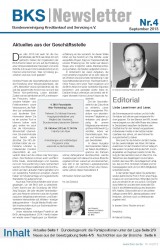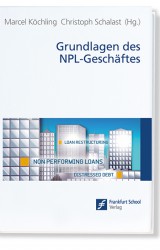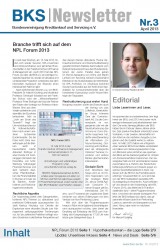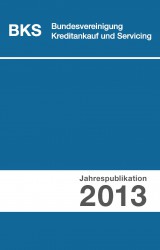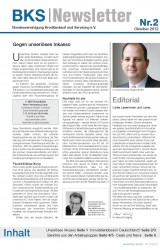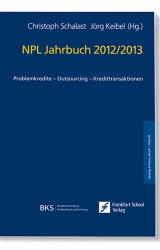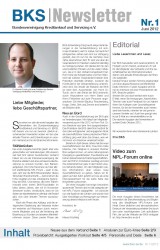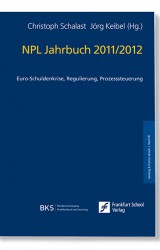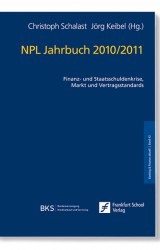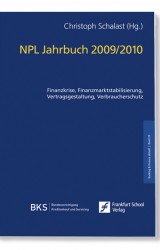July 7, 2016
§ 1 Name, domicile, fiscal year
(1) The association carries the name “Federal Association of Loan Purchase and Servicing” [Bundesvereinigung Kreditankauf und Servicing] (hereinafter called “Association”). It is to be recorded in the Register of Associations. It will thereafter carry the addition “Reg. Ass.” [German: “e.V.”].
(2) The Association is domiciled in Berlin.
(3) The fiscal year is the calendar year.
§ 2 Purpose of the Association
(1) The activity of the Association is not directed toward business operations. The purpose of the Association is
a. to define and pursue the professional interests of companies and managers responsible for sub- or non-performing loans in Germany, to the extent that they have acquired the loans, regardless of if they own, manage or make use of them as so-called “servicers” or “investors”;
b. to create, develop further and establish uniform rules and standards for the transfer, trade and management of non-performing loans;
c. to participate in legislative projects that affect and influence the work of credit portfolio managers and their companies;
d. to promote the exchange of ideas and experiences of credit portfolio managers beyond the boundaries of the profession and the industry;
e. to maintain and support the reputation of this profession, especially through the formulation, maintenance and further development of professional and so-called “corporate governance” rules;
f. to promote the education and advanced training of credit portfolio managers, including the promotion of trainee managers and scientific research and training.
g. to maintain international contacts.
(2) The purpose will especially be fulfilled through:
a. conferences, discussion, educational and advanced training events and measures (including events relating to national politics and association politics) as well as internal working groups;
b. intensive dialogues with decision-makers in business and politics and representation of professional interests towards them and the public;
c. publications, announcements and communications to the members and the public regarding all relevant legal and professional topics through the use of print and online media;
d. the development of uniform guidelines for the legally compliant capital market oriented trade and for the management of non-performing loans under German jurisdiction;
e. the initiation of regular meetings and further events that are intended to serve the maintenance of both professional and personal relationships between the members, both at a regional and nationwide level;
f. the cooperation with other relevant organizations, especially professional associations on the national, European and international levels, as well as standardization organizations who set the rules for the transnational or national trade with non performing loan claims.
g. the publishing of press information and press releases;
h. the appointment of an ombudsman, who is to mediate in disputes that may arise when managing non-performing loans, without great bureaucratic time and effort and outside of legal proceedings;
i. further group-oriented service, consulting and supporting offers that can be realized by the Association on its own or together with a third party.
(3) The Association is selfless and party independent; it does not primarily pursue commercialgoals of its own. The funds of the Association may only be used for the statutory purposes. The members do not receive any share of the profits and their capacity as members does not give them any other benefits from the Association’s funds. No person may benefit from expenses that go counter to the purpose of the Association or result from disproportionately high compensation.
§ 3 Membership
(1) Any individual or legal person, who is predominantly charged with the professional acquisition, trade, management or use of non-performing loans and who does not predominantly own the loan claims as first owners, can become a member of the Association.
(2) Every individual or legal person, who agrees with the goals of the Association and wishes to support it through his/her contributions, may become a supporting member.
(3) Memberships cannot be transferred. The exercise of the rights of members cannot be transferred to another member. Legal persons must name an individual and a deputy who for them are to pursue the rights stemming from the membership.
(4) The application for admission must be made in writing. The Steering Committee makes the decisions regarding the admission of new members. In case of rejection, the applicant must be informed of this in writing. Within one month after the rejection has been received, the applicant may file an appeal in writing, regarding which a decision will be reached by the next annual General Meeting. The appeal decision is to be delivered in writing. There is no right to membership.
(5) A membership is terminated through withdrawal, exclusion, death (individuals) or through dissolution (legal entities) of the member or termination of the liquidation and the resulting cancellation in the register of associations.
(6) Withdrawal from the Association must be declared in writing to the President or Managing Director, and can be made with a notice period of six months at the end of the calendar year.
(7) A member can only be excluded for good cause. Good causes are especially the infringement of statutory duties, being in premium arrears for at least one year, a behavior that damages the goals of the Association, a conviction or a penalty order against a member or his/her proxy that makes continuing membership unreasonable. Considered as behavior that damages the goals of the Association is such that
a) can be attributed directly or indirectly to a member,
b) can damage or put at risk the goals of the Association and/or to impair the reputation of the profession or the Association, and
c) which makes the continuation of the membership relationship with him/her unacceptable for the Association.
The Steering Committee makes decisions regarding exclusion. The involved member is excluded from the voting. In addition to the President, the Managing Director and the Ombudsman also have the right to make suggestions. Except in cases of premium arrears, the Steering Committee must submit to the respective member, at least two weeks before the meeting of the Board at which a decision is to be made regarding the exclusion, a copy of the exclusion application together with a justification. The entire Board of Management must be informed of any written statement by the member involved. The member is informed of the exclusion decision by the Steering Committee in writing and is effective as of delivery. Within one month, the member may file an appeal against the exclusion with the General Meeting, which is to be addressed to the President. The General Meeting makes the final decision. The involved member is excluded from the voting. Legal recourse through general courts of law may be taken against the decision.
The member can file an appeal against the decision within one month after the decision-making through a claim in front of an ordinary court. If the member was absent during the decision-making, the notice period for the appeal starts counting only after he/she has received the exclusion note in writing.
Regardless of a claim, in case of an exclusion the membership rights and the offices of the excluded member are suspended or end with immediate effect.
(8) Possible milder sanctions can be imposed instead of the exclusion in case of a behavior that damages the goals of the Association, infringement of statutory duties, or being in premium arrears for at least one year. Milder sanctions are:
a) admonition during the General Meeting;
b) revocation of voting rights in the General Meeting for two years at most;
c) revocation of active and passive voting rights for offices for two years at most;
d) dismissal,
e) suspension of membership.
Sanctions can be imposed apart or coexisting. Section 7 shall apply accordingly.
(9) If there has been instituted a preliminary proceeding due to suspicion of criminal acts against a member of the Steering Committee or his proxy, he or she can be tentatively deposed from his/her office (suspension) until the suspension of the preliminary proceedings. Section 7, clause 4-12 shall apply accordingly.
(10) No right to a part of the assets arises after the termination of the membership.
§ 4 Statutory organs of the Association
(1) The statutory organs of the Association are
a) the General Meeting
b) the Steering Committee
c) the Managing Director
d) the Advisory Board
e) the Ombudsman.
(2) The General Meeting can decide to form further organs or bodies of the Association.
§ 5 Rights and duties of the members
(1) All members pay membership fees, the amount and due date of which are specified by a dues schedule, which is established by the General Meeting at the recommendation of the Steering Committee for each following fiscal year.
(2) Provided they are not only supporting members, all members are authorized to participate in the events, elections and voting by the Association and to use all further services within the framework of the statutory regulations. This right is tied to the fulfillment of the duty to pay dues.
(3) Supporting members are to be included in the activities of the Association in a suitable way. Especially the publications of the Association, offers of further training and professional help as well as other suitable events of the Association should be made available to them. The Steering Committee makes decisions regarding this.
(4) Individual members, who are not, or are no longer, active as credit portfolio managers, are maintained as supporting members during the time period that they are not active. However, if they are members of the entire Board of Management or of the Steering Committee, they will continue to have membership rights and hold their office until their term of office has ended. All members must without delay inform the Managing Director of the fact that they have begun, interrupted or ended their main professional activity as a credit portfolio manager. Members who do not observe this rule can be excluded for good cause.
(5) Each member is obliged to inform the Association, immediately, in writing, and without being requested, of a change in his/her business, residence and registered address and name. The costs arising to the Association from corresponding investigations must be paid by the member. The costs arising to the Association of a legal action for the assertion (in court) of claims against a member must also be reimbursed to the Association by him.
§ 6 Steering Committee, Advisory Board, Managing Director
(1) The Steering Committee consists of the President, two Vice Presidents, the Treasurer and up to five committee members as further members of the Steering Committee.
(2) The Association is represented judicially and extrajudicially by the President jointly with one of the Vice Presidents or the Treasurer; in case of being prevented, by the President as sole representative. If a Managing Director has been appointed, the Association is represented by the President or the Treasurer together with the Managing Director; in urgent cases or in case of being prevented, by the Managing Director as sole representative.
(3) The President, Vice Presidents, Treasurer and further members of the Steering Committee are elected by the General Meeting for the duration of two years. For all offices, except the offices of the members, separate voting is held. Reelection is permitted. The Board of Management remains in office until reelection. If a member withdraws during his/her term in office, the Board of Management can choose a replacement member for the remaining term of office of the member who has withdrawn.
(4) The Steering Committee conducts the business of the Association and takes care of all tasks, unless they are allocated to a different organ of the Association by the Articles of Association or by law.
The Steering Committee has especially the following tasks:
a. The preparation and execution of the conferences and further events of the Association, the publication of its publications and notices, and the professional representation toward parliaments and governments.
b. The implementation of the decisions by the General Meeting.
c. The convening and preparation of the meetings of the General Meeting. The President or one of the Vice Presidents chairs the meetings of the Steering Committee and the General Meeting.
d. The creation of a project and financial plan for each fiscal year, accounting, creation of the annual report, as well as fulfilling the corresponding legal and regulatory duties.
e. Placing orders and concluding and terminating work contracts, contracts for services and other contracts that are concluded with third parties in support of the fulfilment of the statutory tasks of the Association.
f. The acceptance of members and participation in the exclusion of members.
g. The appointment and dismissal of the members of the Advisory Board and the Ombudsman.
(5) In order to fulfill their tasks and duties, the Steering Committee can employ a Managing Director. Based on a recommendation by the President, the Managing Director is elected by the members of the Steering Committee for the duration of the term of office of the President. He remains in office until a new Managing Director is elected.
(6) If a Managing Director has been appointed, he conducts the Association’s business at his own responsibility, based on the instruction from the Steering Committee. It is especially incumbent on him to properly manage the budget resources, place orders and conclude and terminate work contracts, contracts for services and other contracts that are concluded with third parties in support of the fulfilment of the statutory tasks of the Association, as well as to conduct the internal and external communication. In his management he is excluded from the limitations of §181 of the German Civil Code [BGB]. He is accorded a suitable compensation for his activities, based on a special agreement which also governs the further rights and duties.
(7) The Managing Director is accountable to the Steering Committee. The President is authorized to issue instructions to him. The Managing Director is authorized to participate in the General Meetings and the meetings of all organs of the Association with an advisory vote, with the exception of matters dealing with decision-making regarding himself.
(8) The President and the Treasurer, together with the Managing Director, jointly form the Board of Management in the sense of § 26 of the German Civil Code [BGB] (Representative Committee).
(9) The Steering Committee appoints the Chairman of the Advisory Board and the other members for the duration of two years. A reappointment is permitted. The Advisory Board advises the Steering Committee in the fulfilment of its tasks. The Chairman of the Advisory Board is authorized to participate with an advisory vote in the General Meetings and the meetings of all organs of the Association, with the exception of matters dealing with decision making regarding himself.
(10) The Advisory Board is charged especially with developing and maintaining guidelines for the legally compliant capital market oriented trade and for the management of non performing loans under German jurisdiction as well as for professional standards for managing credit portfolios. Based on a request by the Steering Committee, these are decided by the General Meeting.
(11) The Advisory Board meets at least once every fiscal year; the Steering Committee is to meet twice. Minutes of the meetings are to be kept. The meetings of the Steering Committee and of the Advisory Committee are not open to the public. Minutes of the meetings may, however, be reviewed by the members. The Steering Committee and the Advisory Committee are to establish rules of procedure for themselves.
(12) The members of the Steering Committee and the Advisory Board carry out their duties on an honorary basis. The Steering Committees makes decisions regarding the reimbursement of disbursements and expenditures.
§ 7 General Meeting
(1) The General Meeting comes together at least once a year at the invitation of the Steering Committee. An extraordinary General Meeting is to be convened if the Steering Committee decides to convene it for urgent important reasons or if a tenth of the member’s request, in writing, that the President convene such a meeting, while specifying the reasons. All members of the Association are authorized to attend the General Meeting. Supporting members are not entitled to vote at elections and decision-making voting. All other members are entitled to vote.
As far as a legal person has obtained membership as an affiliated company of another member (corporate membership) and is hence making use of a membership fee reduction according to the dues schedule, this member has voting rights for the affiliated company as well. However, the total number of votes held by the company and its subsidiaries cannot exceed a maximum of 2 votes.
(2) The General Meeting is convened in writing by the President or the Managing Director, with a notice period of at least two weeks, while specifying the agenda. The notice period begins on the day following the mailing of the letter of invitation. The letter of invitation is regarded as having been delivered if it was sent to the last specified address of the Representative Committee. As an invitation it is also sufficient to send an email to the last known email address of the member.
(3) The General Meeting determines the guidelines of the Association’s activities and deals with all basic questions and matters in this regard, especially:
a. election and discharge of the Steering Committee;
b. election of two cash auditors;
c. determination of the membership dues and decision regarding the dues schedule;
d. acceptance of the report and accounts from the Steering Committee and the Ombudsman;
e. appointment of honorary members that are recommended by the Steering Committee;
f. decision-making regarding applications to the General Meeting;
g. decision-making regarding changes to the Articles of Association;
h. dissolution of the Association.
(4) The meetings of the General Meeting are chaired by the President, and by one of the Vice Presidents in case of him being prevented. Every properly convened General Meeting has a quorum. All decisions are taken with a simple majority of the members that are present and are entitled to vote. Changes in the Articles of Association require a two thirds majority of those present, whereas decisions regarding changes in the purpose of the Association or the dissolution of the Association require a majority of three fourths of those present. They can only be made if the wording has been made known in advance in the written invitation. Minutes must be kept of the General Meeting of the Association. The chair of the meeting and the Managing Director underwrite the accuracy of the minutes.
(5) In principle, all elections and voting are held by a show of hands. If, in individual cases, at least one tenth of the members that are present object, secret voting is carried out. In case of a tie vote, the President’s vote decides.
(6) The General Meeting elects the members of the Steering Committee individually and with a simple majority of the members present. In case of a tie vote, a second vote is held. Should the vote again be tied, selection is made by lottery.
(7) The General Meeting elects the Advisory Board members via block voting. The amount of votes is determined by the amount of offices to be filled. If there are more candidates than offices to be filled, the members have the right to use all their votes. However, a member can cast his/her ballot for one candidate only, otherwise the vote is invalid. Those candidates are elected who obtain the most votes. In case of a parity of votes a run-off vote shall decide according to clause 2 and 3
§8 Ombudsman
(1) On a proposal from the Presidium the General Meeting enacts a code of procedure (Ombudsman Code) that regulates all further details of an arbitration. The Ombudsman is to be involved in the definition of the code of procedure in an adequate way.
(2) The Ombudsman should be able to arbitrate in disputes that may arise in the management of non-performing loans, without great bureaucratic time and effort and outside of legal proceedings. All members of the Association are therefore requested to support him in his task in a bureaucratic and effective way, to give him the necessary information conscientiously and promptly, and to examine his recommendations for their decisions in concrete cases of conflict.
(3) The activities of the Ombudsman are not public. He is, however, authorized and obliged to account for his activities to the Advisory Board, the Steering Committee and the General Meeting and to publish the results of his work in a general form. In connection with an arbitration, he may only make concrete statements regarding members to the Steering Committee.
(4) The Ombudsman is not subjected to any directions when fulfilling his tasks. He is reimbursed for his costs and expenses and receives compensation for his general activities from the resources of the Association. If he takes action in a matter that involves a significant violation of the professional regulations of the Association, he may request that a member make a statement and inform the Steering Committee of the incident. In case of recurring incidents or in especially severe cases, he must suggest to the Steering Committee that the member be publicly admonished during the General Meeting, or be excluded, while publicly announcing the reasons.
(5) If an appeal is made to the Ombudsman regarding a matter that does not involve a member, he only takes action if the person in question voluntarily submits to the rules of the Ombudsman procedure and declares that he will pay for the costs of his activities. Should this not occur, the Ombudsman is obliged to make public the reason why arbitration does not occur.
§ 9 General, coming into effect of the Articles of Association
(I) The General Meeting transfers to the Steering Committee the right to determine changes in the Articles of Association that are required by the authorities (district courts, tax offices and others) within the framework of their jurisdiction. These changes may neither substantially change the purpose of the Association nor limit the rights of its organs and members.
(2) The Articles of Association take effect when they are entered into the Register of Associations for the first time.







